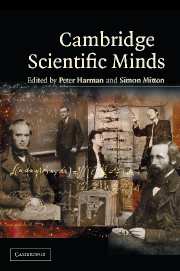Book contents
- Frontmatter
- Contents
- Foreword
- Introduction
- 1 William Gilbert
- 2 William Harvey
- 3 Isaac Newton: Creator of the Cambridge scientific tradition
- 4 William Whewell: A Cambridge historian and philosopher of science
- 5 Adam Sedgwick: A confident mind in turmoil
- 6 Charles Babbage: Science and reform
- 7 Charles Darwin
- 8 Stokes and Kelvin, Cambridge and Glasgow, light and heat
- 9 James Clerk Maxwell
- 10 The duo from Trinity: A.N. Whitehead and Bertrand Russell on the foundations of mathematics, 1895–1925
- 11 Thomson, Rutherford and atomic physics at the Cavendish
- 12 Hopkins and biochemistry
- 13 Charles Sherrington, E.D. Adrian, and Henry Dale: The Cambridge Physiological Laboratory and the physiology of the nervous system
- 14 Hardy and Littlewood
- 15 Arthur Stanley Eddington
- 16 Paul Dirac: A quantum genius
- 17 Alan Turing
- 18 Francis Crick and James Watson
- 19 Mary Cartwright
- 20 Joseph Needham
- 21 Molecular biology in Cambridge
- 22 The discovery of pulsars – prelude and aftermath
- 23 Stephen W. Hawking
2 - William Harvey
Published online by Cambridge University Press: 05 June 2014
- Frontmatter
- Contents
- Foreword
- Introduction
- 1 William Gilbert
- 2 William Harvey
- 3 Isaac Newton: Creator of the Cambridge scientific tradition
- 4 William Whewell: A Cambridge historian and philosopher of science
- 5 Adam Sedgwick: A confident mind in turmoil
- 6 Charles Babbage: Science and reform
- 7 Charles Darwin
- 8 Stokes and Kelvin, Cambridge and Glasgow, light and heat
- 9 James Clerk Maxwell
- 10 The duo from Trinity: A.N. Whitehead and Bertrand Russell on the foundations of mathematics, 1895–1925
- 11 Thomson, Rutherford and atomic physics at the Cavendish
- 12 Hopkins and biochemistry
- 13 Charles Sherrington, E.D. Adrian, and Henry Dale: The Cambridge Physiological Laboratory and the physiology of the nervous system
- 14 Hardy and Littlewood
- 15 Arthur Stanley Eddington
- 16 Paul Dirac: A quantum genius
- 17 Alan Turing
- 18 Francis Crick and James Watson
- 19 Mary Cartwright
- 20 Joseph Needham
- 21 Molecular biology in Cambridge
- 22 The discovery of pulsars – prelude and aftermath
- 23 Stephen W. Hawking
Summary
William Harvey was a student at Gonville and Caius College in Cambridge, entering in May 1593 at the age of fifteen and staying until 1599, when he was twenty-one. Harvey is the celebrated discoverer of the circulation of the blood. This was, and still is, simply the most important discovery about the anatomy and physiology of the human and animal body that has ever been made. All of our modern physiological understanding is based on this discovery. Harvey made the discovery on his own, in the course of his private researches in London sometime around 1618, and he was so overwhelmed by what he had discovered that it was not until ten years later, after repeatedly presenting it to the criticisms of his colleagues in the College of Physicians in London, that he could bring himself to publish it.
Harvey was born on 1 April 1578 in Folkestone in Kent, where his father was mayor on four occasions. Harvey was educated at The King's School, Canterbury, and then he was awarded the Matthew Parker scholarship, which was restricted to boys from The King's School, and this took him to Gonville and Caius College in Cambridge. This college had been founded out of Gonville Hall, a somewhat decayed hall for students, by John Caius (pronounced ‘Keys’), a celebrated physician, in 1557. At that time Caius (as the college is known for short) was the most medical of all the colleges of Cambridge or Oxford, with more people studying medicine there than at any other college.
- Type
- Chapter
- Information
- Cambridge Scientific Minds , pp. 21 - 35Publisher: Cambridge University PressPrint publication year: 2002
- 1
- Cited by



